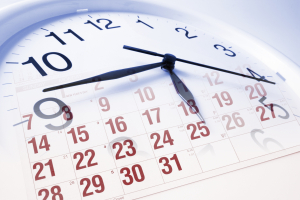Python – Tijd en Datum

Er zijn een aantal manieren om datum en tijd weer te geven in python, zie het voorbeeldscript hieronder.
|
1 2 3 4 5 6 7 8 9 10 11 12 13 14 15 16 17 18 19 20 21 22 23 24 25 |
import datetime now = datetime.datetime.now() print print "Current date and time using str method of datetime object:" print str(now) print print "Current date and time using instance attributes:" print "Current year: %d" % now.year print "Current month: %d" % now.month print "Current day: %d" % now.day print "Current hour: %d" % now.hour print "Current minute: %d" % now.minute print "Current second: %d" % now.second print "Current microsecond: %d" % now.microsecond print print "Current date and time using strftime:" print now.strftime("%Y-%m-%d %H:%M") print print "Current date and time using isoformat:" print now.isoformat() |
|
1 2 3 4 5 6 7 8 9 10 11 12 13 14 15 16 17 |
Current date and time using str method of datetime object: 2014-09-26 16:34:40.278298 Current date and time using instance attributes: Current year: 2014 Current month: 9 Current day: 26 Current hour: 16 Current minute: 34 Current second: 40 Current microsecond: 278298 Current date and time using strftime: 2014-09-26 16:34 Current date and time using isoformat: 2014-09-26T16:34:40.278298 |
Meer opties met datum en tijd:
| Aanroep: | Betekenis: |
| %a | Locale’s abbreviated weekday name. |
| %A | Locale’s full weekday name. |
| %b | Locale’s abbreviated month name. |
| %B | Locale’s full month name. |
| %c | Locale’s appropriate date and time representation. |
| %d | Day of the month as a decimal number [01,31]. |
| %H | Hour (24-hour clock) as a decimal number [00,23]. |
| %I | Hour (12-hour clock) as a decimal number [01,12]. |
| %j | Day of the year as a decimal number [001,366]. |
| %m | Month as a decimal number [01,12]. |
| %M | Minute as a decimal number [00,59]. |
| %p | Locale’s equivalent of either AM or PM. |
| %S | Second as a decimal number [00,61]. |
| %U | Week number of the year (Sunday as the first day of the week) as a decimal number [00,53]. All days in a new year preceding the first Sunday are considered to be in week 0. |
| %w | Weekday as a decimal number [0(Sunday),6]. |
| %W | Week number of the year (Monday as the first day of the week) as a decimal number [00,53]. All days in a new year preceding the first Monday are considered to be in week 0. |
| %x | Locale’s appropriate date representation. |
| %X | Locale’s appropriate time representation. |
| %y | Year without century as a decimal number [00,99]. |
| %Y | Year with century as a decimal number. |
| %Z | Time zone name (no characters if no time zone exists). |
| %% | A literal “%” character. |
Datum in Nederlandse taal
Python geeft standaard Engelse benamingen weer voor weekdagen en maanden, om dit in het Nederlands weer te geven, kun je locale gebruiken, een voorbeeld:
|
1 2 3 4 5 6 7 8 |
import time import locale # Lokale taal omgeving wellicht eerst in te stellen met raspi-config locale.setlocale(locale.LC_ALL, 'nl_NL') WEEKDAG = time.strftime("%a").upper() print WEEKDAG |
Bron: www.saltycrane.com


